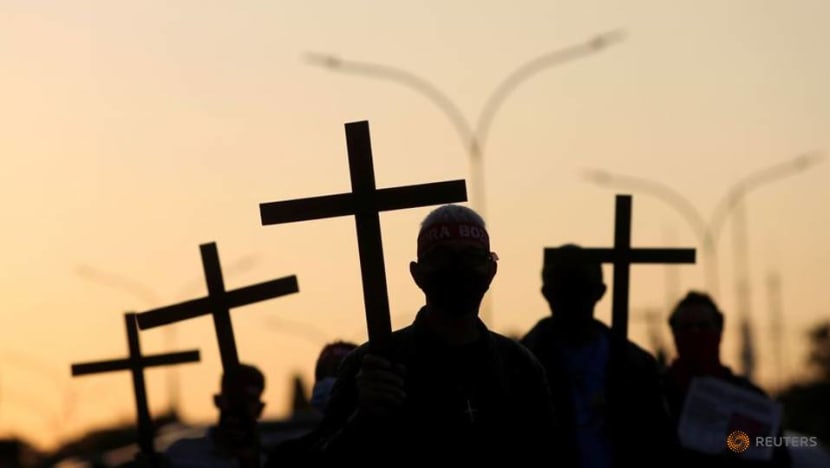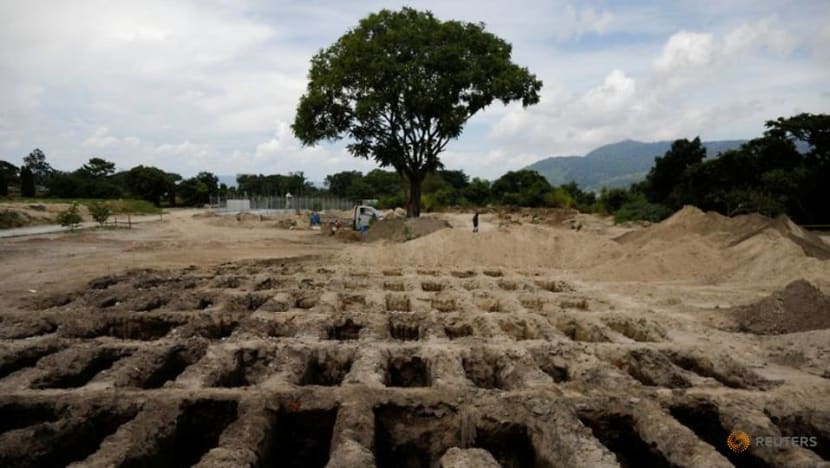Global COVID-19 deaths approach 800,000
The global death toll from the coronavirus approached 800,000 on Saturday, according to a Reuters tally, with the United States, Brazil and India leading the rise in fatalities.

FILE PHOTO: People hold crosses as they attend a tribute to the 100,000 victims of the coronavirus disease (COVID-19) and a protest against Brazil's President Jair Bolsonaro, in Sao Paulo, Brazil August 7, 2020. REUTERS/Amanda Perobelli/File Photo
PARIS: The global death toll from the coronavirus approached 800,000 on Saturday (Aug 22), according to a Reuters tally, with the United States, Brazil and India leading the rise in fatalities.
Nearly 5,900 people are dying every 24 hours from COVID-19 on average, according to Reuters calculations based on data from the past two weeks that ended on Friday.
That equates to 246 people per hour, or one person every 15 seconds.
The rate of deaths is holding steady with it taking 17 days to go from 700,000 to 800,000 deaths - the same time it took to go from 600,000 to 700,000.
The US death toll surpassed 170,000 on Sunday, the highest in the world. While the number of new cases is down from a peak in July, the country is still seeing over 360,000 new cases a week.
Many public schools and universities reopened classrooms to students despite positive test rates of nearly 20 per cent in some parts of the country. Less than a week after welcoming students, some schools are switching to online-only learning due to a spike in infections.
In India, the world's second-most populous country, COVID-19 deaths topped 50,000 on Monday, five months after the country reported its first coronavirus fatality.
India is only the third country, behind Brazil and the United States, to record more than 2 million infections. It has a relatively low case fatality rate of 1.9 per cent, compared to the world average of 3.5 per cent, but that may be due to underreporting.
Case fatality rates are about 3 per cent in the United States and Brazil.
Health experts have raised the alarm that Brazil and the United States still have no coordinated plan to fight the pandemic, as many officials focus on reopening schools and businesses, which is likely to worsen the outbreak.
Brazil's death toll from COVID-19 passed 100,000 on Aug 8 and continues to climb as most Brazilian cities reopen shops and dining even though the pandemic has yet to peak there.
READ: WHO chief hopes coronavirus pandemic will last less than two years
World Health Organization chief Tedros Adhanom Ghebreyesus has sought to draw favourable comparisons with the flu pandemic of 1918 which cost the lives of as many as 50 million people.
"We have a disadvantage of globalisation, closeness, connectedness, but an advantage of better technology, so we hope to finish this pandemic before less than two years," he said.
"(By) utilising the available tools to the maximum and hoping that we can have additional tools like vaccines, I think we can finish it in a shorter time than the 1918 flu."
The WHO also recommended children over 12 years old now use masks in the same situations as adults as the use of face coverings increases to stop the virus spread.
"VERY PRECARIOUS STAGE"
With no usable vaccine yet available, the most prominent tool governments have at their disposal is to confine their populations or enforce social distancing.
South Korea, which had largely brought the virus under control, became the latest country to announce it would boost restrictions to try to stem a new outbreak, after 332 new cases were reported in the past 24 hours - the highest daily figure since early March.
"We are at a very precarious stage where we could see the beginning of a nationwide second wave," Health Minister Park Neung-hoo said at a press briefing.
The expanded measures include restrictions on gatherings and activities including professional sports, which will be played behind closed doors again, while beaches nationwide will close.
"DON'T FEEL INVINCIBLE"
Italy - once the European epicentre of the virus - said Saturday it had registered more than 1,000 new infections in the past 24 hours, the highest level since the end of a punishing lockdown in May.
The story is similar across Spain, Germany and France.
The Rome region also said it had recorded a record number of cases in the past 24 hours, a rise health officials blamed on people returning from holiday.
READ: Italy tops 1,000 daily COVID-19 cases for first time since May
Most of those infected are young people who are not showing symptoms, the Italian capital's health official Alessio D'Amato said, warning them to stay at home.
"Don't feel invincible," he urged them.
In Germany, a university launched a series of pop concerts under coronavirus conditions, hoping the mass experiment with 2,000 people can determine whether large events can safely resume.
"CORONAVIRUS CATASTROPHE?"
Elsewhere, Lebanon launched two weeks of measures on Friday including nighttime curfews, as the country is still dealing with the fallout from a huge explosion in Beirut that killed scores of people.
"What now? On top of this disaster, a coronavirus catastrophe?" said 55-year-old Roxane Moukarzel.
Officials fear Lebanon's fragile health system would struggle to cope with a further spike in COVID-19 cases, especially after some hospitals near the port were damaged in the explosion.
The Americas have borne the brunt of the virus in health terms, accounting for more than half of the world's fatalities.
"We lead the world in deaths," Joe Biden said while accepting the Democratic nomination for the US presidential election on Thursday.
He said he would implement a national plan to fight the pandemic on his first day in office if elected in November.
New daily US cases have been dropping sharply for weeks - but experts are unsure if Americans will have the discipline to bring the epidemic under control.

Latin American countries are counting the wider costs of the pandemic - the region is not only suffering the most deaths, but also an expansion of criminal activity and rising poverty.
Without an effective political reaction, "at a regional level we can talk about a regression of up to 10 years in the levels of multidimensional poverty", Luis Felipe Lopez-Calva of the UN Development Programme told AFP.
But the WHO said the pandemic appeared to be stabilising in Brazil, and any reversal of its rampant spread in the vast country would be "a success for the world".
BOOKMARK THIS: Our comprehensive coverage of the coronavirus outbreak and its developments
Download our app or subscribe to our Telegram channel for the latest updates on the coronavirus outbreak: https://cna.asia/telegram












